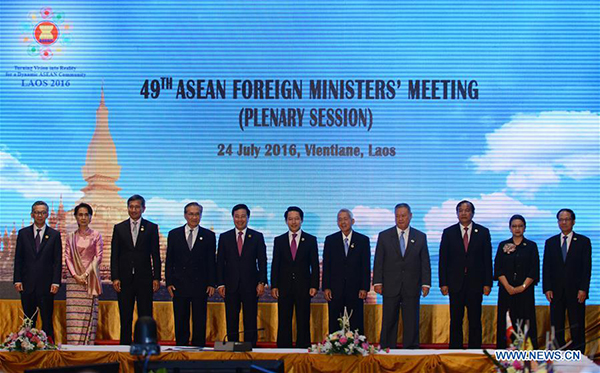China-ASEAN exchanges go beyond the arbitration
Updated: 2016-07-26 07:12
(China Daily)
|
|||||||||
 |
|
Participants pose for a group photo before the ASEAN Foreign Ministers Meeting in Vientiane, capital of Laos, on July 24, 2016. The 49th ASEAN Foreign Ministers Meeting kicked off here on Sunday. [Photo/Xinhua] |
The communiqué issued on Monday after the ASEAN foreign ministers' meeting in Vientiane, Laos, shows the two sides want to work together for regional stability and prosperity.
By refraining from mentioning the recent award in the arbitration case initiated by the Philippines, the members of the Association of Southeast Asian Nations have shown their resolve to go forward and not let its agenda be derailed, or even hijacked, by some countries out of ulterior motives.
As the communiqué notes, the solution to the disputes rests on efforts to "enhance mutual trust and confidence", and "exercise restraint" by avoiding actions that may complicate the situation.
This echoes China's long-held position that the maritime disputes should be resolved through bilateral negotiations between the parties directly concerned.
It is the Declaration on the Conduct of Parties in the South China Sea that serves as a guideline to solve the disputes.
The maritime disputes should never be an issue between China and ASEAN although the United States has been trying to internationalize the disputes after it implemented its rebalancing to the Asia-Pacific strategy. Thus they do not define the relationship, which is built on their common interests.
After all, there are many far more important issues than the South China Sea disputes that call for immediate action and closer collaboration, such as poverty, smuggling and terrorism.
Failure to find solutions to these problems threatens peace, stability and prosperity in the region.
Actually, 25 years after China established dialogue relationship with ASEAN, the potential for cooperation has never been greater.
Over the years, bilateral trade has surged nearly 60 times its size in 1991 to reach $472 billion in 2015, and the two sides have set the target of achieving $1 trillion in trade by 2020.
China is ASEAN's biggest trading partner and also the first country to establish a free trade agreement with the bloc. The country sees ASEAN as a good partner in building the Silk Road Economic Belt and the 21st Century Maritime Silk Road, a strategy aimed at boosting infrastructure and trade across Asia, Europe and Africa.
The ASEAN communiqué, as well as a joint statement issued later after a meeting between Chinese Foreign Minister Wang Yi and his counterparts from members of the regional bloc, indicate their relationships are resilient enough to withstand discord and outside interference.
They suggest that attempts by the US and Japan, which are not directly involved in the South China Sea disputes, to exploit the arbitration case and drive a wedge between China and ASEAN will not succeed.
Related Stories
Beijing, ASEAN agree talks are right path 2016-07-26 03:07
ASEAN countries urged to 'dispel disruptions' 2016-07-25 13:41
ASEAN skirts new consensus 2016-07-25 08:04
China, ASEAN seek to jointly build community of common destiny 2016-07-24 21:40
49th ASEAN Foreign Ministers Meeting kicks off in Laos 2016-07-24 21:28
Ruling won't hinder the healthy development of cooperation between China and ASEAN 2016-07-19 07:33
Today's Top News
Syrian suicide bomber in Germany faces deportation
Shooting at Florida nightclub kills, wounds 16
One dead, 12 injured in blast near Nuremberg
IOC declines to issue blanket ban of Russian athletes
French president urges Britain to begin EU exit talks
Turkey to restructure its army after coup attempt
UK to keep close economic ties with Germany: May
China's Fosun buys UK's Wolves for 45 million pounds
Hot Topics
Lunar probe , China growth forecasts, Emission rules get tougher, China seen through 'colored lens', International board,
Editor's Picks

|

|

|

|

|

|







